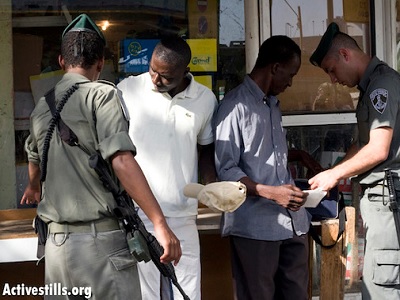
By Nicola Perugini and Neve Gordon
On January 22, protests in solidarity with African asylum seekers were held in front of several Israeli embassies all over the world. By this time most media outlets both in Israel and around the world had lost their interest in their plight, even though the crux of the matter, the twisted logic informing Israeli policies towards the asylum seekers, had not been adequately exposed.
Let us go back to the beginning of the recent events. During the protests which took place at the beginning of 2014, tens of thousands of African asylum seekers, mainly from Eritrea and Sudan, filled Rabin Square in Tel Aviv, sending a clear message to the Israeli government: “Yes to freedom, no to jail”. “We,” they went on to claim, “are refugees, not infiltrators”.
The massive rally was propelled by an amendment to Israel’s Prevention of Infiltration Law, which allows the state to “detain migrants who enter the country illegally for up to a year without trial, and to hold those already in Israel in an open detention facility indefinitely”. The Eritreans and Sudanese occupied public spaces and protested in front of the UNHCR and foreign embassies (the US Embassy was shut down) against Israel’s treatment of asylum seekers, which includes denial of visas, denial of proper asylum procedures, arbitrary detentions and deportations.
The impressive mobilization of asylum seekers—the first in Israel’s history—is the result of these discriminatory state-policies, which have already been condemned by major international human rights NGOs and the UN, as well as a response to a more general incitement against migrants. Suffice it to mention some key-statements made by senior government officials on the “infiltrator issue” (the infamous categorization used by the government to deal with asylum seekers) in order to highlight the pervasive atmosphere of intolerance.
Former Minister of the Interior Eli Yishai exclaimed, for example, that “those who want to work to ensure a Jewish and Zionist state for our children should act. We will make the lives of infiltrators bitter until they leave.”
“These are not refugees,” averred Israeli Prime Minister Netanyahu following the January 5 protests, “but people, who are breaking the law and whom we will deal with to the fullest extent of the law”.
This kind of rhetoric has characterized the mainstream Israeli discourse on asylum seekers in recent years. Thus, it was not particularly surprising that in the days following the massive rally in Tel Aviv, thinly veiled racist op-eds appeared in major Israeli newspapers like Yisrael Hayom, Yedioth Aharonot and The Jerusalem Post.
One editorial argued that “Israel, created to be the only state in the world where the Jewish people can exercise self-determination, will never solve the socioeconomic ills of Africa. It does, however, risk losing its strong Jewish majority if it continues to absorb thousands of African migrants”. Another article maintained that: “Since its foundation, Israel has been struggling for its survival against hundreds of millions of its neighbors-enemies and their supporters around the world; it cannot take in tens of thousands – and in the future even hundreds of thousands – of infiltrators. Every sensible person understands that this is not a problem of racism but of existence.”
The Prevention of Infiltration Law, as well as the statements of high-ranking government officials and the editorials, all expose a central feature about Israel, revealing, as it were, something profoundly disturbing about the nature of the state.
At least in the eyes of the member states comprising the United Nations in the late 1940s, Israel was created as a human rights reparation for the crimes of genocide committed against Jews in Europe. Indeed, the state that was established as a homeland for surviving Jewish refugees was constructed as an entity whose raison d’etre was and, as the quotes above show, continues to be the preservation of ethnic purity. The tragic irony is that this kind of purity is not dissimilar to the purity informing the logic of the nation-states that perpetrated the violence of World War II.
In other words, the state which denies the rights of people in search of both refuge (Africans) and return from refuge (Palestinians), is reproducing itself in the image of those nation-states which have constituted themselves in a framework of ethnic pureness. While the experiences of asylum seekers and dispossessed Palestinians are different, and while it would be a grave mistake to compare Israel with perpetrators of genocide, there is still a differing common-ness which unveils how, in Israel, preserving the existence of the state dovetails with racist intolerance.
– Nicola Perugini is Assistant Professor and Head of the Human Rights and International Law Program at the Al Quds Bard Honors College (Jerusalem). You can follow him @PeruginiNic
– Neve Gordon is the author of Israel’s Occupation. He contributed this article to PalestineChronicle.com. Visit: http://www.israelsoccupation.info.




